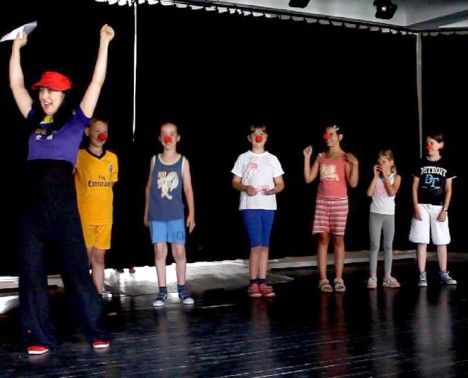Testimony by Roni M (now a former) EVS volunteer in Jászberény (Hungary) where she taught drama classes to local children for 10 months.
Autumn, winter and spring in Hungary went by. The cherries on the big trees in our garden were starting to ripen; everything was nearing its fruition and end. During the months of May and June I had been working hard with the children in our theatre towards their final shows, all of which have been devised originally from scratch. I made final shows with five of my eight groups, a fact which provided for a very busy few months.
Each show represented the final product of each group’s own process: I had tried to provide each group with a devising theme that will at once express and complete the process it had gone through throughout the year. In this way, for example, the group of children aged 7-9, who always seemed to be occupied competing, quarrelling and making up with each other, participated on stage in “The Very Difficult Olympics”, a series of clownish games designed to challenge them to create the possible from impossible demands in creative ways, requiring their co-operation with each other. For example: “Can you… build a house in 10 seconds?” asked the master of ceremonies; “Yes, we can!” they all answered together (to all of her questions), and helped each other into the shape of a house made from their bodies. The group of adults with learning difficulties made a show derived from their favourite game in class, “Watching TV”, and extending it into a sequence they had the good challenge of learning by heart, in which the protagonist enters into her TV and becomes the star of the show while the channels and programmes keep changing around her in surprising ways. And for the final show of my youngest group, comprised of 5-7 year-olds, I chose a theme that I found both them and I to have a good connection with: the seasons (as I had described in the previous post, over the months I spent in Hungary I found that each season had a very different character, and going through the four of them during the course of the year, I was fascinated by this very experience of “growing” with the seasons). Painting an imaginary “summer” with real brushes, music, mime and movement, we poetically depicted the process the children in this group had gone through during the year in their drama classes, a journey during which they discovered many treasures and which culminated towards a sense of “gaining” independence – as expressed in the final scene, in which I stepped out of the picture. The short choreographed sequence was followed by an act of “real independence” in which they acted out a play on the theme of “summer” they have created on their own, for the first time this year, with minimal intervention from my side.
Perhaps most challenging for me to create was the final show of my Visual Theatre group of 10-14 year-olds which started in winter and went through a relatively intensive process of experimentation with many different media around the question “how can we combine visual art in performance?” Created using many forms of puppetry and animation, it included a few different scenes the students have created in small groups around the theme we have chosen together of “The Body”. The show was made in a tight time frame due to the fact that the group participants had different commitments towards the end of the year which prevented them from participating in the sessions regularly. A day before the final show, as rehearsals obviously needed to come to an end, I sat and pondered heavily the difficult question of how to combine the different sketches into one piece. Finally, desperate for fresh ideas, I turned that question to the participants of the group. In five minutes they had come up with a story which not only made perfect sense but was wonderfully comic and inventive as well. What I learnt from it, apart from the fact the a devising process is best started much sooner than you think would be needed, is that in any case of doubt about anything creative – ask a child. They will supply the answer without having to think too hard!
All the shows were presented to the parents in two (rather hot) evenings. The children and adults were all incredibly excited and performed incredibly well, showing a sense of responsibility and commitment, which made me very proud. Then on poured the thanks, flowers, tears and hugs from participants and parents… Suddenly it struck me that things really did come to an end, and how complete this process was over the 10 months in Jászberény during which I learnt to become a drama teacher, a profession based on one thing: love.
I went onwards to a new job doing the very same thing in a new country. It was thanks to my 10-month EVS position that I realised I definitely want to continue pursuing the path of drama in community, and that I got my new job, having gained some very valuable experience in the field. I am grateful for Malom Film-Színház for choosing me for this project and providing an amazing experience like no other; and for Everything is Possible for being there to provide support along the way and, in fact, for making it all possible – namely taking a “Yes, we can” approach after other organisations had turned me down for being in a position with fewer opportunities. I cannot express how much your support and help in realising my right to apply for the programme has helped me. I was able to make a huge professional progress from the situation I was in thanks to you. It really wouldn’t have been possible without you. Thank you.
Roni
European Voluntary Service (EVS) project supported by the Erasmus+ programme of the European Commission.
